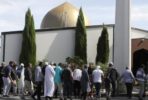KUALA LUMPUR — The threat of the Islamic State looms large over Malaysia, where the authorities have arrested dozens of suspected militants and uncovered several terror plots planned in the name of the militant group in recent months.
Those detained come from all walks of life, making it extremely challenging, if not impossible, for the authorities to profile suspects and pre-empt attacks.
The country’s top counterterrorism official Ayub Khan said the challenge of dealing with the Islamic State is having to fight ideology rather than an organisation. “(The Islamic State’s) doors are open to anybody … We have our work cut out for us as we are monitoring not just organisations or groups, but also individuals,” he said.
In the most recent case, six suspected militants were charged last week — the youngest being a 17-year-old. The six were part of a group of 12 who were arrested near Kuala Lumpur last month for plans to attack Putrajaya, the federal parliament and entertainment venues with explosives.
The police also detained one of the youngest Malaysians who wanted to join the group in February — a 14-year-old girl who planned to marry a man, 22, in Egypt before heading to Syria to join the militant cause.
Since April 2013, Malaysia has arrested 107 for suspected militant activities. They include military personnel, civil servants and university students, among others — a worrying sign that even people who serve the nation are buying into the group’s ideology. Two men from the Royal Malaysian Air Force were charged last month along with four other suspected militants for plotting to kidnap high-profile figures, rob banks and raid armed-forces installations.
Malaysia passed the controversial Prevention of Terrorism Act Bill last month, giving the police sweeping powers to arrest and detain those suspected of terrorist activities.
Last August, the police arrested 19 who had formulated plans to bomb pubs and a Malaysian brewery managed by Carlsberg. These were targeted reportedly because Islam forbids the consumption of alcohol.
A group of radicals arrested last year were planning to attack several targets in Malaysia and had their sights set on a wider campaign — the creation of an Islamic caliphate that includes Singapore, said the counterterrorism division.
The Islamic State has been adept at spreading its propaganda on social media, making it difficult for authorities to distinguish when pre-emptive action should be taken.
“We don’t go after these sympathisers as there is no evidence to show they are involved,” Mr Ayub said, but added that the counterterrorism division is taking all possible measures for intelligence gathering and making arrests. Officers are also sent to engage the people by giving talks at schools.
When asked if Singapore and Malaysia are on high alert for attacks, Mr Ayub replied: “The IS threat is a global problem. We are working with other countries through the exchange of information and intelligence.”
Of the 200 Malaysians who were fighting in Iraq and Syria, some have died as suicide bombers and others in combat.
Indonesia faces a similar growing threat from the Islamic State and launched a six-month operation in April to crack down on militants with suspected links to the group. The authorities believe about 500 Indonesians have joined the group in Syria and Iraq. AGENCIES
Source: www.todayonline.com







